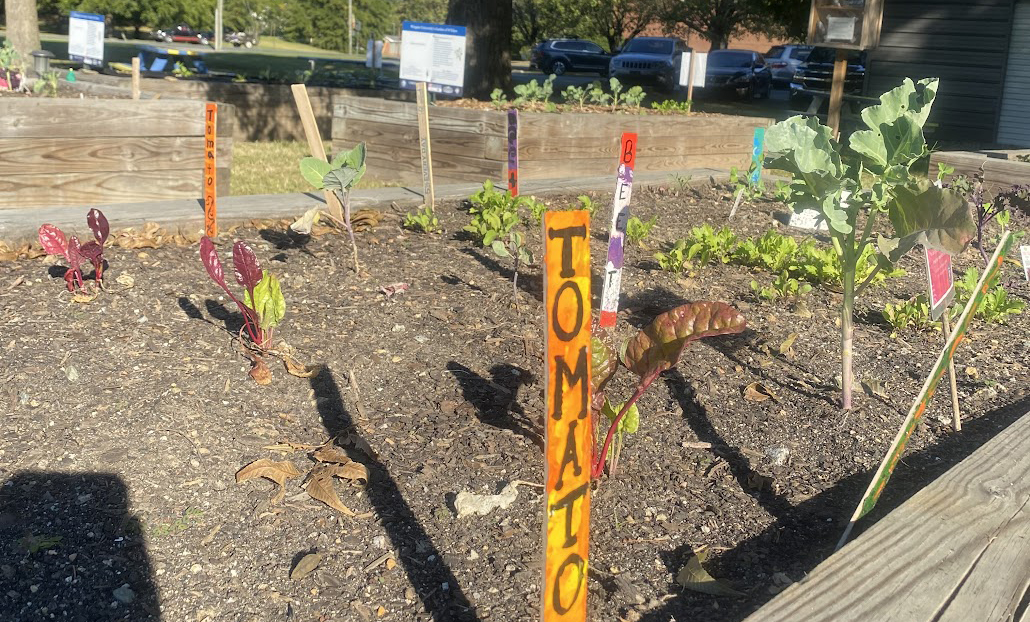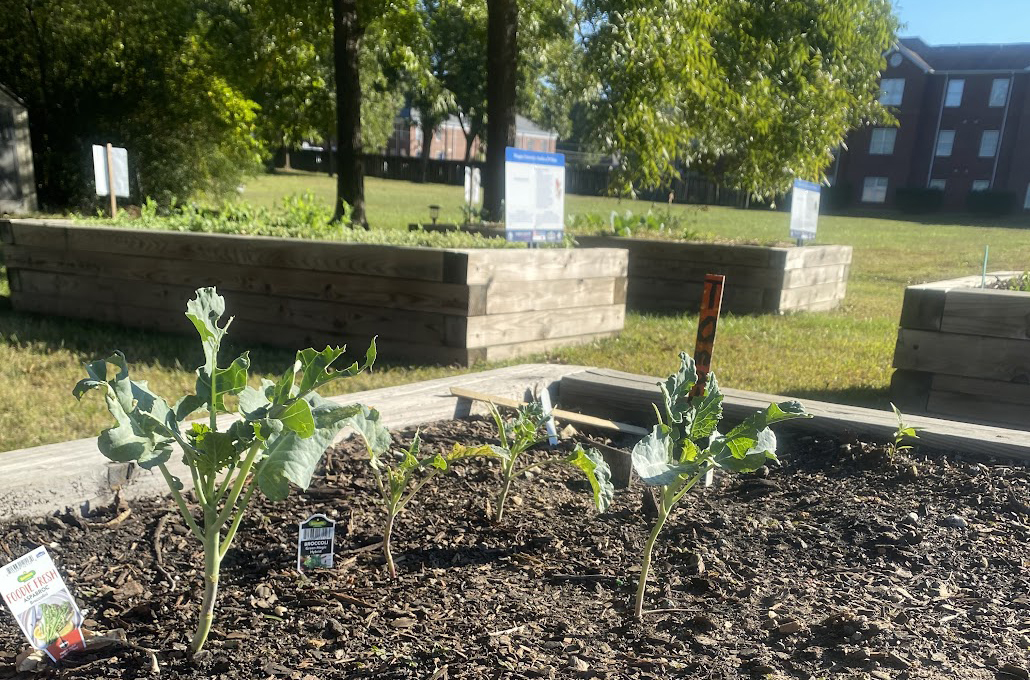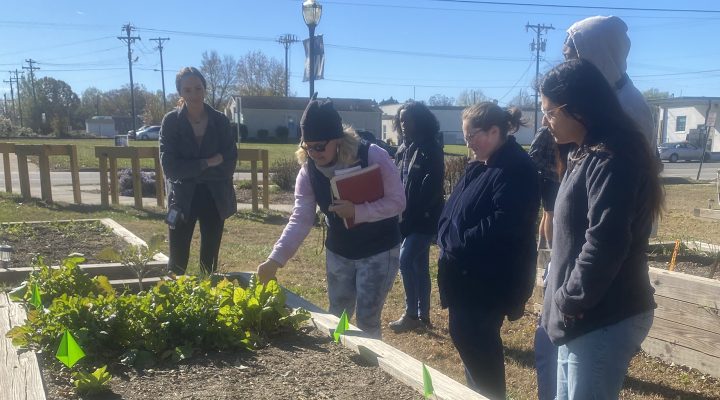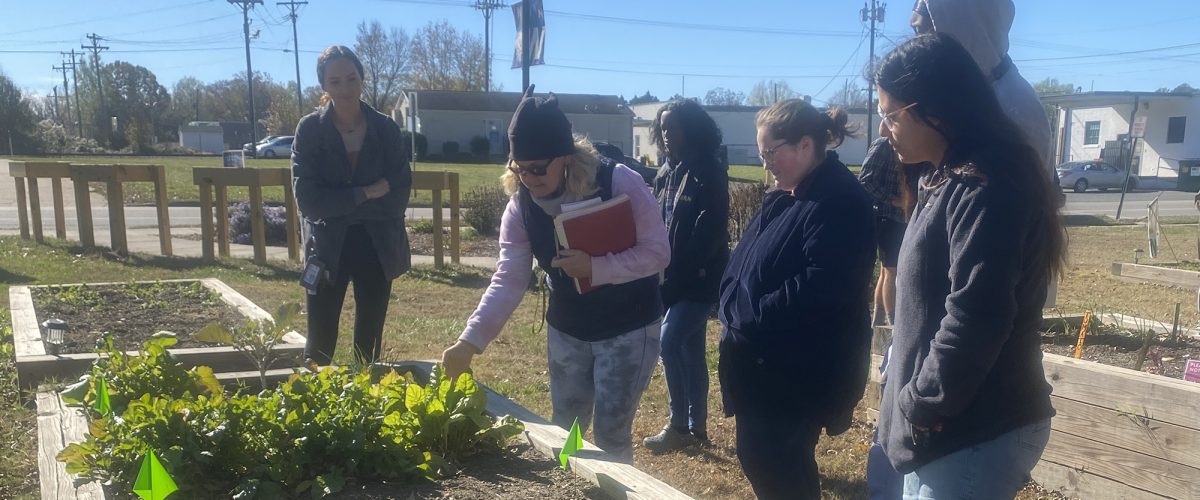New to Wingate University’s religion department is a course titled Food and Faith, a class that takes freshmen through the basics of religious eating practices, discusses the ethics of food in popular culture and even incorporates some instruction time in the kitchen and community garden.
To kick off the course, this semester’s sections were taught and designed by Catherine Wright and Shea Watts. Wright is an eco-theologian who also teaches ethics and theology as an associate professor at Wingate. Watts is a visiting professor at Wingate who teaches other freshman courses including Global Perspectives in Scriptures and World Religions.
Another professor, Harry Workman, intended to teach the course this semester but was unable to due to previous work commitments, although he contributed to the design of the course.
Food and Faith was designed to teach students about religion, eating, injustice and social change in a broad spectrum of categories, asking students to question what they are eating, why they are eating and what are the ethics of their consumption.
Pedagogy and course design
Designing this new course was “daunting but exciting,” Watts said. “Food is tied to meaning, memory and life itself, so it is something sacred. How we eat, what shapes our values and tastes, is no small matter. We think about food all the time, but we don’t always think critically about it. So, we approach this topic with reverence and shared responsibility.”
“We think about food all the time, but we don’t always think critically about it.”
To honor the sacred and personal aspect of food, Watts and Wright included frequent discussion boards called “breadcrumbs” where students were asked to honestly reflect on course content and activities, such as cooking demonstrations or garden time.
Reflecting on the reasons she wanted to design this course, Wright said she was excited “to do the research into high-impact practices that really do help persistence and retention,” and then create ways to implement them in practically. She wanted this course to encourage students to be excited about their college careers.

“There was much grace involved too,” she acknowledged. “What if our students do not respond as anticipated in literature? What will community partners think of being thought of as a partner?”
Wright predicted it will take some time to know the true impact of the course. “I will be able to say more after analysis of the data collected, but from what students and community partners have written, there have (already) been such positive impacts for our students and community.”
Learning in unconventional ways
Throughout the course, students took a tour through the broad and growing field of food and faith. The course began with a discussion about theology as it relates to food and faith, but only for a brief time. As students learned the basics of spiritual eating, they began planting their own foods in Wingate’s community garden and learned how to cook with weekly in-class cooking demonstrations.
When asked about their time in the garden, students responded positively.
Trinity said the course “helped me understand the significance of gardening, piquing my interest in starting my own with the knowledge of when and what to grow.”
“I have always wanted to know what it’s like to plant seeds, and I finally accomplished that in this class.”
Kylah said gardening was a great memory for her during this course. “I have always wanted to know what it’s like to plant seeds, and I finally accomplished that in this class.”
Maya said she enjoyed gardening because it taught her how life is interconnected. “It made me feel as though I was part of something bigger than myself.”
Other students agreed, saying the course fostered a sense of community that was unique compared to other courses.
Students also shared some fond memories from their cooking demonstrations.
Dionna said after being challenged to broaden the scope of her cooking skills, her new knowledge in the kitchen has encouraged her to cook at home more often.

Cara shared a funny story, recalling a day when the students accidentally added too many hot peppers to their taco recipe but did not realize it until it was on their plates. She tried the tacos and said they were “so spicy because of the jalapenos.”
Other students reflected on the feeling of togetherness that cooking and eating together brought to the classroom. Madison recalled a time when she stayed after class to finish making grilled cheese and cookies with a few other students. “It felt like we were a community.”
While students explored these creative modes of learning, they dove into other areas of course content, including food’s impact on social media, gender and race, or the pathways through which foods are produced. Thus, students were introduced to collegiate course content both in and out of the classroom.
As the semester progressed, garden sessions shifted into individual visits outside of class, and the cooking sessions ended. Then, course rigor picked up as students began to learn about religious practices and traditions surrounding food, focusing on feasting and fasting. This primed them for close-up discussions on the halal and kosher diets of Islam and Judaism, as well as the practice of ahimsa (nonviolence) of Jainism.
Students completed the semester by tying it all together with discussions about food insecurity, climate change and hunger. In these final discussions, students utilized their base knowledge of theology, culture and food pathways to consider what can be done to improve society’s eating habits and production methods.
End-of-semester reflections
There was much learning to be done during this semester both for students and the professors — all new to this educational venture.
Wright said she learned some logistical things about teaching style and pedagogy and believes applying this experience to future classes will be invigorating. “For my teaching style, 50 minutes is too short a class for cooking and for how I structure dialogue among students and community partners.”
She also learned two pedagogical tips: First, choice is not always better. When given multiple reading options for homework assignments, students often were overwhelmed. Second, asking input for final assessment questions can be helpful and “yield some wonderful fruit.”
As a first year visiting professor, Watts said he “learned a lot about pedagogy in general and teaching this class in particular.” He found students learn better when they are invested in the topics being taught.
“Food breaks down the barriers that religious studies can put up around cultural differences such as identity, values, belief,” he said. “So I learned a lot about the need for hospitality as a foundation of justice, the overall thoughtfulness of students, and the generative conversations that can happen when a class full of peers is invested and engaged.”
Why teach a course on food and faith to college students?
Wingate’s religion department often features courses on special topics courses as upper-level electives for religious studies majors to fulfill graduation requirements. However, Food and Faith is being offered as part of the university’s general education curriculum and may be taken by incoming freshmen (of any major) seeking to fulfill their required religion or philosophy credit, or any other students looking for an interesting elective. It is a 140-level course.
“Faith is about ultimate concern and food is about sustenance.”
Both Wright and Watts think discussions about food offer a common denominator for students looking to explore their palates.
“Food is something everyone can relate to, and it is a springboard for interfaith dialogue that seems less perilous than other avenues,” Wright explained. “This approach to teaching about different faiths and cultures across the globe takes the often purely theoretical content (that other courses emphasize) and brings it to life in practical ways students can relate to.”
Watts agreed, calling food a “common denominator” for college students to talk about important issues. “Faith is about ultimate concern and food is about sustenance, so it seems like a great common denominator for talking about how we nourish and are nourished by life. You don’t have to be religious, per se, to have ultimate concerns.”
Mallory Challis, who serves as BNG’s Clemons Fellow, is a senior religious studies major at Wingate University. She took this course for the first time as a teaching assistant, completing an independent study called Pedagogy and Course Design.
Related articles:
There’s a spiritual side to food | Opinion by Mallory Challis
How travel and food break through barriers that divide us | Opinion by Phawnda Moore
A rural church reimagines the Lord’s Supper as a farm stand | Opinion by Justin Cox
In Aunt Minnie’s kitchen, I learned about fellowship, food and family | Opinion by Justin Cox


